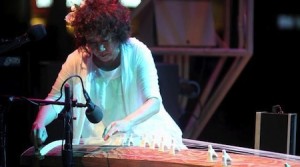
Despite its imagery of atomic annihilation, the name Hiroshima was selected by the eclectic, five-member band of world-class world musicians for a definite purpose, said the band’s positively explosive artistic force, June Kuramoto.
“Many Japanese resent us for naming the group Hiroshima but when they understand that our purpose is to continue the message of peace and they hear our music, then they understand,” said Kuramoto.
“It’s always good to have controversy, it brings everything to the forefront and at the same time draws attention to ‘Yes, that happened, we can learn from it.’ It’s our responsibility to learn from it and, stronger yet, we rise, like the phoenix, above the ashes.”
Like balancing the negative with the positive, the yang with the yin, Kuramoto says the band’s effusive fusion is birthed in love. “It all comes from the heart,” she said.
And, like the phoenix, their music does rise, as do the spirits of anyone fortunate enough to catch their concerts, including their rare Laguna Beach engagement next Monday night, April 15, at the Laguna Playhouse.
With mastery of talent on all instruments and vocals, what makes the band particularly soar is its centerpiece, Kuramoto’s virtuosity on the ancient court instrument, the koto. She’s been playing the stringed zither-like instrument since she was 7 and taught its classical style for 20 years, until the band’s tour dates took off.
Kuramoto herself is globally recognized as an innovator in fusing the koto’s lilting harp-like sound with the more ethnic tones of world music. “In the band, I have creativity to write songs and improvise,” she said. Kuramoto plays a 13-stringed koto that’s six feet-three inches long and 10 inches wide.
Centuries ago, the koto, a plucked instrument familiar in many traditional Asian songs, was reserved for the court elite and not available to outsiders because of its believed qualities to facilitate a light spirit or enlightenment, according to Kuramoto. Placed on a flat surface, the koto and its many Asian varieties is played like a zither but produces deep, resonant overtones more like a harp.
“In the 17th Century, somehow someone snuck it out and it was made public,” she said. “At that time, the koto music changed radically and it opened up to different scales and tuning. It had more European influences and became more modern. It blossomed.”
Despite the band’s attempt to redeem the human spirit from any war-torn imagery, Kuramoto is paradoxically scorned in Japan.
“If a woman plays the koto in Japan, it’s a great attribute,” she explained. “They resent my playing it because they consider me not Japanese and because it’s a revered instrument. I think they resent that I was trained here and I did not go back. I believe that’s why we’re not as popular in Japan as we’d like to be.” The band hasn’t toured Japan for 15 years.
Born to a Japanese mother and an American father in Saitama-ken Japan near Tokyo, Kuramoto grew up in the Crenshaw district of Los Angeles since she was 4. Even at that age, she missed her homeland but never heard the koto until she lived here.
“It made me feel tranquil and it made me feel Japanese,” she said. “As a little girl, I did not know where I was going, I did not know what moving meant or what living in another country meant. It was my connection back to Japan, I missed it.”
The band was birthed by Dan Kuramoto, June’s husband, back in the ‘60s when he and his brother decided to bring a positive force to counter the then-maligned image of Asians. They call their music “urban” world music, street smarts mixed with artistic sophistication. “We all grew up in ghettoes,” she said. “We’re what we like to call multicultural. We’re a microcosm of the world. It reflects our background, it reflects our culture, it reflects how we grew up in a world that’s edgy.”
The group was nominated for a Grammy in 2010 and has attained two gold records. After more than 30 years in the recording industry and nearly 4 million records sold, Hiroshima ventured out with their own record label with their last CD, “Departure,” and promote record sales on their website.




